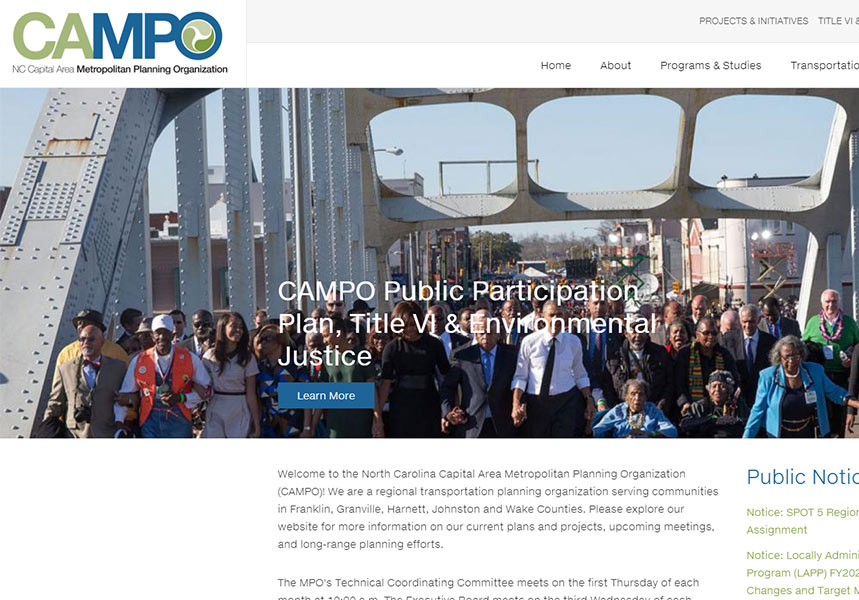The North Carolina Capital Area Metropolitan Planning Organization (CAMPO) is updating the Southwest Area Study (SWAS) transportation plan in cooperation with partners that include Wake County, Harnett County, Apex, Angier, Holly Springs, Fuquay-Varina, NCDOT and other transportation agencies. This study will lay out a long-term vision for a transportation network that integrates planned and existing roads, bus and rail services, and bicycle and pedestrian facilities in southwestern Wake and northeastern Harnett counties. The updated plan will include a detailed implementation strategy with short-term and mid-term recommendations to aid with the implementation of a long-term vision. The study will evaluate the safety of and mobility in the transportation network. Key elements will be project recommendations, concept designs, school accessibility studies, and best practice recommendations to help integrate growth and transportation needs.
C A P I T A L A R E A V I S I O N
The region has a common vision of what it wants its transportation system to be: a seamless integration of transportation services that offer a range of travel choices and are compatible with the character and development of our communities, are sensitive to the environment, improve quality of life and are safe and accessible for all. The long range Metropolitan Transportation Plan commits our region to transportation services and patterns of development that contribute to a distinctive place where people can successfully pursue their daily activities.
G U I D I N G P R I N C I P L E S
The Southwest Area Study represents a regional approach for local agencies that collaborate to identify and address strategies to improve transportation services and facilities across jurisdictional boundaries. The following are the principles that will guide the prioritization of improvements to inform the next Metropolitan Transportation Plan:
LIVABILITY
Protecting community character while balancing all of the following:
- Mobility needs
- Housing and transportation affordability
- Accommodating future growth
- Facilitating active living / transportation
MOBILITY AND ACCESSIBILITY
Improving transportation choices for everyone with coordinated roadway, bicycle, pedestrian, and transit strategies that mutually support transportation and land use initiatives. Emphasizing accessibility and improved choices in travel routes and modes for everyone, regardless of age or ability.
TECHNOLOGY Embracing innovations that transform travel patterns and transportation habits.
SUSTAINABILITY
Promoting, in three forms:
- Economic Vitality– Investing in transportation services and facilities that support a diversified
economy with more jobs in the study area. - Environmental Balance—Preserving environmentally sensitive areas, scenic viewsheds and
rural heritage lands. - System Preservation—Prioritizing investments to preserve the existing transportation
system.
S T U D Y L E A D E R S H I P
The Study Oversight Team (SOT) includes representatives from the Core Technical Team (CTT) jurisdictions and agencies listed below, as well as GoTriangle, the Wake and Harnett County Public School Systems, Duke Energy, the North Carolina Division of Environmental Quality (NC DEQ), the Mid-Carolina Rural Planning Organization, local chambers of commerce, and other community groups. The SOT will provide highlevel overview of the study direction, and help promote the study to a broader array of stakeholders. The Core Technical Team (CTT) is comprised of professional staff from Harnett and Wake Counties, the Towns of Angier, Apex, FuquayVarina, and Holly Springs, GoTriangle, the North Carolina Dept. of Transportation (NCDOT), CAMPO, and the consultants to review the consultant’s work, give direction and input, monitor the project study as it takes place and report back to the Study Oversight Team.
SHARE THIS

